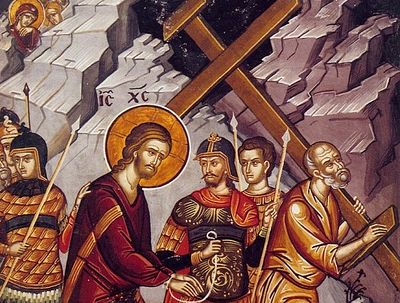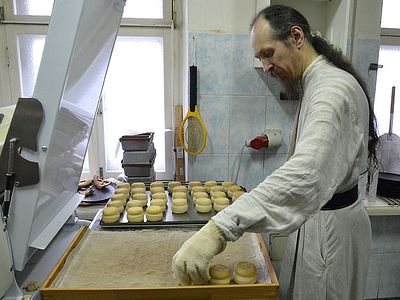 The Liturgy is a Conversation Between God and ManThe Divine Liturgy is a conversation between man and God: The priest addresses God in his prayers, and God answers through the grace of the Holy Spirit He sends down, and this is how God and man meet.
The Liturgy is a Conversation Between God and ManThe Divine Liturgy is a conversation between man and God: The priest addresses God in his prayers, and God answers through the grace of the Holy Spirit He sends down, and this is how God and man meet.
“>Part 8A
 Warrior saints. Fresco from Psača Monastery in North Macedonia. Photo: byzantine-art.com
Warrior saints. Fresco from Psača Monastery in North Macedonia. Photo: byzantine-art.com
After the choir sings the First Antiphon, the deacon reads the litany:
Again and again in peace let us pray to the Lord.
Help us, save us, have mercy on us, and keep us, O God, by Thy grace.
Calling to remembrance our most holy, most pure, most blessed, glorious Lady Theotokos and Ever-Virgin Mary, with all the saints, let us commit ourselves and one another, and all our life unto Christ our God.
We discussed these petitions in previous talks.
While the deacon is proclaiming the litany, the priest is in the altar reading the Prayer of the Second Antiphon:
O Lord our God, save Thy people and bless Thine inheritance, preserve the fullness of Thy Church, sanctify them that love the beauty of Thy house; do Thou glorify Them by Thy Divine power, and forsake not us that hope in Thee.
“O Lord our God, save Thy people and bless those who inherit Thy Kingdom…”
You see, Christ is called the leader of the people. He is the God-Man, and therefore, as our Intercessor before God, He stands at the head of His people and prays for the salvation of Christians (cf. 1 Tim. 2:5). After all, it is we Christians who are now the chosen people of God—certainly not the people of Israel. Israel was the chosen people until the hour of Christ’s Crucifixion.
It’s not because this people was something special in and of itself, but because this people was to give birth to the Most Holy Virgin Mary—the most perfect of women who alone was capable of giving birth to and bringing God into the world. After the  The Crucifixion of Christ, Part 1We have reached the lesson on the Crucifixion. I will be talking to you today about the history of the Crucifixion, what it entailed, as well as some of the spiritual insights the Fathers have for us on the Crucifixion.
The Crucifixion of Christ, Part 1We have reached the lesson on the Crucifixion. I will be talking to you today about the history of the Crucifixion, what it entailed, as well as some of the spiritual insights the Fathers have for us on the Crucifixion.
“>Crucifixion of Christ, the New Israel is the Church of Christ. No matter what nationality we are—Greeks, Turks, Arabs, Russians, Americans—if we’re members of the Church of Christ, then we’re all the people of God and brothers by grace.
The ultimate goal of all of the Church’s prayers is the salvation of man.  The Way to SalvationIf all you do is wait for favorable conditions for your salvation to come, you will never begin to lead a life pleasing to God.
The Way to SalvationIf all you do is wait for favorable conditions for your salvation to come, you will never begin to lead a life pleasing to God.
“>Salvation is our real need—everything else is secondary. Christ commanded us to seek the Kingdom of God first of all, and promised that everything else would be added unto us (cf. Lk. 12:31).
Preserve the fullness of thy Church.
In other words, protect by Your grace all Christians, who are members of Your Church. By becoming members of the Church, we join the ranks of its army. We’re spiritual warriors and must fight against the opposing forces that try to crush the work of the Church. Just as soldiers fight in lines across the battlefield, so we Christians wage a spiritual battle, each in his own place: some at work, others at home, others at school—anywhere. A warrior of Christ has to repel attacks from his neighbors, from his coworkers, from his wife or from her husband, from his children, from his classmates or teachers. This war is waged in words, in deeds—in various ways. Sometimes those around us don’t have a conscious desire to be hostile towards Christians. Nevertheless, by freely engaging in sin, they show hostility against those who bear the name of Christ and desire to love God. Nowadays, sin is not only freely committed, but also advertised in every way, which is also a war against us. Young people in particular join this battle every day. We labor and make every effort to resist temptation and reject sin, while our neighbor boasts of his sins and success in evil daily. To refuse sin in such a situation is a great feat to which we’re called. Therefore, we pray to the good God to preserve the members of His Church from worshipping the idol of sin that stands before them every hour.
Sanctify them that love the beauty of Thy house…
Let’s focus on this a little bit. As you see, the Church remembers in its prayers all those who love the splendor of the house of God. Today you can find Christians who want churches to be empty inside, without any interior decoration. “What do you need all these chandeliers and candlestands in church for?” they ask.
Undoubtedly, a church remains a house of God even without interior decoration. The Church, as you remember, was born and grew up in caves and catacombs. Moreover, we could get by entirely without stone churches. The divine services could be celebrated in a simple shack or hut. If you go to Africa, you’ll see that many churches there are huts with thatched roofs. There’s nothing wrong with that. However, we ourselves need our churches to be beautiful, for God’s house to be distinguished by a special splendor, for churches to be places that can help man in and of themselves.
As you can see, the Church has its own architecture: Churches are built quite differently from other buildings. The Church has its own music: Here we sing quite differently from how they sing in the world. The Church has its own decoration, its own aroma, its own fragrance. In your homes, you use air fresheners and fragrances, but in the churches, none of these are used—here we have incense, sweet-smelling frankincense. Imagine how it would look if, during the singing of, “Let my prayer arise in Thy sight as incense,” instead of censing with frankincense, the priest used a can of air freshener. Don’t laugh, because I’ve heard that things like this happen abroad, in non-Orthodox churches. I was told that in one church, a priest (non-Orthodox) didn’t want to cense and fill the church with smoke, so he installed some kind of device with sprayers in the church. When the typikon called for censing, he would press a button, the sprayers would start, and the church would fill with the scent of jasmine, lemon, and whatever else.
The Church has, let’s say, its own taste: The faithful taste koliva,  Holy BreadOf course I prayed, and asked Great Martyr Barbara, because it was the eve of her commemoration. And the prosphora turned out fine! Sunday, at the Liturgy, Father Superior sees the prosphora and they are normal service prosphora… “Fr. Cyprian, whose prosphora are these?” “Ours, Batiushka.” “What happened to you?” “Batiushka, it’s God’s mercy.”
Holy BreadOf course I prayed, and asked Great Martyr Barbara, because it was the eve of her commemoration. And the prosphora turned out fine! Sunday, at the Liturgy, Father Superior sees the prosphora and they are normal service prosphora… “Fr. Cyprian, whose prosphora are these?” “Ours, Batiushka.” “What happened to you?” “Batiushka, it’s God’s mercy.”
“>prosphora, Divine Communion. The Church canons, for example, punish, up to the point of defrocking, a priest who doesn’t pour hot water (the warmth) into the holy chalice while celebrating the Liturgy and communes the faithful with cold Holy Gifts (for example, Canon 13 of St. Nicephorus of Constantinople). Why is it so important to pour in hot water? Because a Christian should feel during Communion that he’s partaking of a Living Body and Living Blood, not dead. Also, the priest must strictly monitor how much water he pours into the chalice. There shouldn’t be too much water, so the wine and bread don’t lose their taste. Prosphora is baked in a specific way—you can’t use any other kind of loaf in place of prosphora.
The Church has its own music, its own architecture, its own painting, its own decoration. The Church acquired all this not only through the many centuries of the experience of the saints, but also through God-given revelations. When Moses built the Tabernacle, God Himself showed him what and how to do it. God warned Moses: “Look, do exactly as you saw on the Holy Mountain, as I showed you. Don’t build it otherwise. You must measure so many cubits in length, so many in width. You must make these particular items (cf. Ex 25–27). This is how to prepare incense (cf. Ex. 30:34–36).” And God didn’t allow the Israelites to use incense for other, non-liturgical purposes. Incense is something dedicated exclusively to the house of God.
Why do we try to build churches of God with special splendor? So that everyone who enters the church would understand that this place belongs to God and would feel His presence, pray to God, and receive His blessing. If you sit in church for a few hours, you’ll be shocked by how many people come to find rest, to calm down, to be at peace, to pray. How important it is that people would find the appropriate atmosphere there, so that when they go inside they would understand that this is a special place, with its own beauty, its own warmth. And this is all the work of human hands, inasmuch as churches are built by men. That’s why we pray for the builders of holy churches and all those who love the beauty of the house of God.
There was one saint who, when buying a candle in church, would choose the cleanest, shiniest coin. If the coin was a little dirty, he’d clean it with a handkerchief. Why did he do this? In order to offer the best, the purest to God. Simplicity! But this simplicity shows the nobility of the human soul.
Do Thou glorify Them by Thy Divine power…
To those who glorify You, who offer You sacrifice, who serve You with the works of their hands, give them, my God, the glory of Your Divine power.
And forsake not us that hope in Thee.
Don’t abandon us who place our hope in You. We hope on You and we call upon You.
For Thine is the dominion, and Thine is the kingdom, and the power and the glory of the Father, and of the Son, and of the Holy Spirit: now and ever, and unto ages of ages.
To be continued…